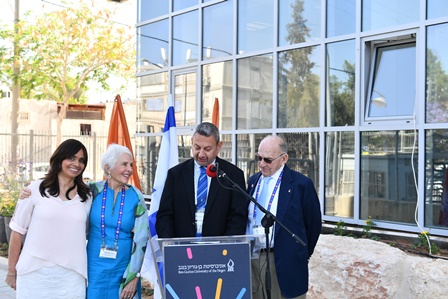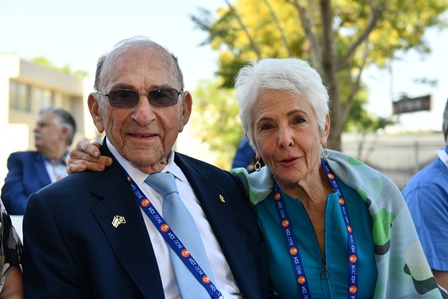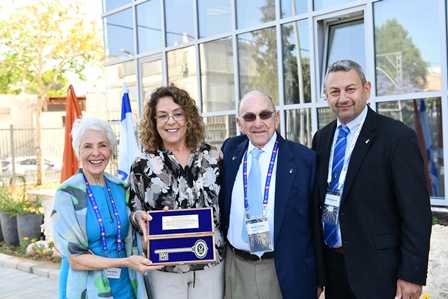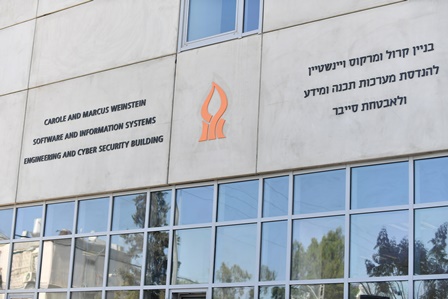The Carole and Marcus Weinstein Software
and Information Systems Engineering and Cyber Security Building was inaugurated
last week as part of Ben-Gurion University of the Negev’s 47th Board of
Governors Meeting in the presence of Carole and Marcus Weinstein. The building
reflects BGU’s commitment to being the best in cyber security research.
Prof. Bracha Shapira also became the
incumbent of the new Carole Weinstein Chair in Information Systems Engineering.
Shapira is head of the Department of Software and Information Systems Engineering.
Prof. Dan Blumberg, VP & Dean of R&D: “I am so very honored to be standing
here today to mark the official dedication this state-of-the-art facility that
will house ground-breaking research and learning.
“We
live in an age that we need to consistently be ahead of the game and lead the
technology race. It is of utmost
importance for us to have the tools and the environment that will allow us to
proudly pioneer the information systems and cyber research fields. It is this relative
advantage that placed BGU on the innovation map and in the global technology
arena. Marcus and Carole – Thank you for
recognizing our need to find a home that will foster the great minds of today
and tomorrow,” he said.
BGU President Prof. Rivka Carmi
spoke to the character and passion of the Weinsteins, “What seems like just
yesterday, on November 13, 2012, I had the opportunity to meet two very special
people who came to visit Ben-Gurion University during the Pillar of Defense
operation. I remember wondering, what kind of people would chose to come visit
a war zone with missiles falling almost without warning? Now, not even 5 years
later, Marcus and Carole, you have become pillars of our community and dear
friends of mine.
“Marcus and Carole Weinstein come from
Richmond, VA, the capital of the Commonwealth of Virginia, and a city rich with
history, culture and personality. What strikes me most every time I visit is
how Marcus and Carole have contributed and made a difference in their hometown
and the surrounding region. Together they have introduced me to the University
of Richmond, the Virginia Holocaust Museum, the Virginia Historical Society and
the Weinstein JCC, all institutions that are better today thanks to the passion
and perseverance of these two very special people. It is this same passion and
perseverance now shaping Ben-Gurion University as we see today.”
Turning to the nature of the cyber threat,
Carmi remarked, “This is a battle of wits fought with lines of code in an
ever-expanding cyberspace. Despite its virtual nature, the threat to physical
systems remains very real. Unless they are protected, basic life-sustaining
infrastructures, such as electricity, water and transportation – are
susceptible to devastating attacks. Ben-Gurion University of the Negev is at
the forefront of this battle, bringing together academic expertise,
professional experience and the enthusiasm, drive and passion of our
researchers and students in an environment that encourages innovation while
developing real solutions.”
“For research to develop and bear fruit and
for our students to succeed at the highest possible level we need excellent
people at the helm,” Carmi said, “Prof. Bracha Shapira is an excellent
scientist whose accomplishments to date are outstanding. With her as head of
the department, BGU was the first university in Israel to introduce cyber study
tracks for undergraduate and graduate students, attracting the best and
brightest students and researchers from around the world.”
Prof. Shapira, “I am standing here in front of this beautiful building and this
is one of those moments in life when one feels that dreams really do come
true. I can already imagine this
building coming to life with students taking classes in the state-of-the-art
teaching labs and faculty and research students doing research in the offices
and labs and making them cozy, hanging pictures on the walls and growing
plants. This great facility is where fantastic research will happen and
knowledge will be acquired, with the goal of protecting the world and making it
a better place to live.
“This is of course thanks to you Carole and
Marcus. Thank you to for your generosity, your vision and your care for this
university. You will have a part in
every significant research that we will conduct here and in every success
story,” she declared.
“This building is of great importance to
the Department of Software and Information Systems Engineering,” Shapira
explained, “The Department is expanding constantly. Next year, we have five new young faculty
members joining us, arriving after spending time as post-docs at the most
prestigious universities in the United States. We were fortunate to have the
opportunity to offer them nice offices and labs where they can continue their
research together with tenured faculty members. We are also growing in the
number of students: we currently have more than 600 undergraduate students that
will use the labs in this building, including the unique cyber teaching lab. We
have 140 research students that are doing research in various fields, mainly
cyber security, artificial intelligence, and other aspects of information
systems with various application domains such as health, finance, and
education.”
Carole Weinstein noted that she has been a “tech junkie” for years, so the
building’s purpose was close to her interests.
Turning to the importance of the research
to be done, she said, “All Israelis are united in cyber security.”
Marcus Weinstein added, “Thank you for providing the opportunity to invest in the State
of Israel and Ben-Gurion University. When you contribute funds to education,
it’s not a charity, it’s an investment.
“This is about Tikkun Olam, trying to make
the world a better place. Israel is the envy of the world because that’s where
the brains are,” he declared.
“I’m 91 years old, and I want to thank the
State of Israel for making this Jewish boy a first class citizen. Israel has
made all 14 million Jews left in the world first class citizens,” he concluded.
Prof. Dan Blumberg replied to general
laughter and applause, “We promise you a high ROI [Return on Investment].”
The Weinsteins were honored later the same
day with honorary doctorates. They are members of the President’s Pillars and
new members of the Board of Governors. Marcus Weinstein founded a successful
real estate company in Virginia.
The building will house a number of
state-of-the-art labs. One such is Dr. Yossi Oren’s Implementation Security
Lab. Dr. Oren is a senior lecturer
(assistant professor) in the Department of Software and Information Systems
Engineering and member of BGU's Cyber Security Research Center. The purpose of this lab is to carry out
side-channel attacks – cyber attacks that allow the extraction of secret
information from various devices by exploiting their precise physical behaviors
(such as power consumption, electromagnetic emanations, heat or vibrations).
The research conducted in the lab will be grounded on knowledge attained as
part of the EU-funded ECRYPT project and use precise measurement equipment and
techniques to assess the impact of side-channel attacks by measuring the
leakage of a target device, such as an IoT device, under test. This will allow researchers to obtain an
upper bound on the potential performance of attacks carried out using less
sensitive measurement devices such as compromised phones or malicious
aftermarket peripherals. In addition,
Dr. Oren plans to use this lab to find creative and unexpected uses for the
sensors found on modern mobile phones, such as the gyroscope, touch screen, and
magnetic compass.
The new state-of-the-art building was
designed to meet the specialized needs of the software and information systems
engineering and cyber fields, which are powered by technology, information, and
computers. However, needs vary greatly
among researchers, and each of the building’s research labs requires
customization. In addition to the
computer equipment which this field relies upon, the lab is equipped with
sensitive measurement apparatus such as oscilloscopes, wideband receivers, and
signal generators, and a designated space has been allocated for this
equipment. Other areas of the lab will
be dedicated to measurement work and electronics, and the lab will include
ample space for electronics, tools, and other necessary components. The lab has a dedicated power supply and
network ports, and features 24/7 air conditioning, allowing long, unattended
measurements and experiments to be run remotely overnight and over long periods
of time.




